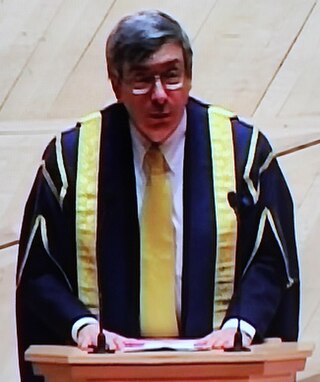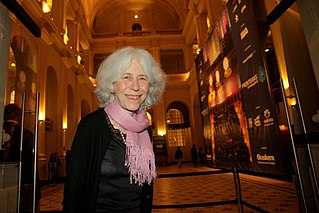William Julius Wilson is an American sociologist, a professor at Harvard University, and an author of works on urban sociology, race, and class issues. Laureate of the National Medal of Science, he served as the 80th President of the American Sociological Association, was a member of numerous national boards and commissions. He identified the importance of neighborhood effects and demonstrated how limited employment opportunities and weakened institutional resources exacerbated poverty within American inner-city neighborhoods.

Julia Elizabeth King, Baroness Brown of Cambridge, is a British engineer and a crossbench member of the House of Lords, where she chairs the Select Committee on Science and Technology. She is the incumbent chair of the Carbon Trust and the Henry Royce Institute, and was the vice-chancellor of Aston University from 2006 to 2016.

The term German model is most often used in economics to describe post-World War II West Germany's means of using innovative industrial relations, vocational training, and closer relationships between the financial and industrial sectors to cultivate economic prosperity. The two key components of the German model is a national system for certifying industrial and artisan skills, as well as full union participation in the oversight of plant-based vocation training.

Sir Richard Hughes Trainor,, is an academic administrator and historian who served as the Principal of King's College London from 2004 to 2014. He was previously the Vice-Chancellor of the University of Greenwich from 2000 to 2004. He is currently Rector (head) of Exeter College, Oxford.

Sarah Virginia Brinton, Baroness Brinton, known as Sal Brinton, is a British politician who served as president of the Liberal Democrats from 2015 to 2020. In November 2010 she was nominated to the House of Lords, taking her place on 10 February 2011 having been created Baroness Brinton, of Kenardington in the County of Kent on 4 February. After Jo Swinson lost her seat at the 2019 general election, Brinton and Sir Ed Davey became acting co-leaders of the Liberal Democrats. After Brinton's term as party president ended, her successor Mark Pack also succeeded her as acting co-leader with Davey. Davey was elected as permanent leader of the party in 2020.

Peter Richard Grenville Layard, Baron Layard FBA is a British labour economist, co-director of the Community Wellbeing programme at the Centre for Economic Performance at the London School of Economics, and co-editor of the World Happiness Report. Layard is an economist who wants public policy to be targeted at the wellbeing of the people. To this end he has written 6 books and some 40 articles.

Martin Harry Wolf is a British journalist who focuses on economics. He is the chief economics commentator at the Financial Times. He also writes a weekly column for the French newspaper Le Monde.

Emma Georgina Rothschild is a British economic historian, a professor of history at Harvard University. She is director of the Joint Centre for History and Economics at Harvard, and an honorary Professor of History and Economics at the University of Cambridge. She formerly served as board member of United Nations Foundation and as a professor at the École des hautes études en sciences sociales (EHESS) in Paris.

Pauline Perry, Baroness Perry of Southwark is an educator, educationist, academic, and activist. She is a Conservative politician and was for 25 years a working member of the British House of Lords. In 1981 she became Her Majesty's Chief Inspector of Schools in England. In 1986 she became Vice-Chancellor of South Bank Polytechnic, and serving during its transition to a university, became the first woman in history to run a British university.

Sir David Edward John Ramsden CBE is a British economist and has been Deputy Governor for Markets and Banking at the Bank of England since 4 September 2017. He was previously Chief Economic Adviser to HM Treasury and Head of the Government Economic Service, having previously served as Joint Head of the Service with Vicky Pryce, formerly Chief Economic Adviser and Director-General at the Department for Business, Innovation and Skills.
The Institute for Learning (IfL) was a voluntary membership, UK professional body. It ceased operating on 31 October 2014. Although precise membership figures and statistical details had been removed from IfL's webpage prior to its closure, at the end of financial year 2013-2014 IfL were reported as having only 33,500 of their 200,000 members remaining.

The International Growth Centre (IGC) is an economic research centre based at the London School of Economics, operated in partnership with University of Oxford's Blavatnik School of Government.

Mariana Francesca Mazzucato is an Italian–American-British economist and academic. She is a professor in the Economics of Innovation and Public Value at University College London (UCL) and founding director of the UCL Institute for Innovation and Public Purpose (IIPP). She is best known for her work on dynamics of technological change, the role of the public sector in innovation, and the concept of value in economics. The New Republic have called her one of the "most important thinkers about innovation".
Santosh Mehrotra is a development economist, whose research and writings have had most influence in the areas of labour, employment, skill development, on the relationship between human development and economic growth, child poverty, and the economics of education. He was an economic adviser in the United Nations system in New York City, Italy, and Thailand (1991–2006), and technocrat in the government of India (2006–2014), apart from making contributions to academic research since the mid-1980s. He has also in recent years established a reputation as an institution-builder in the field of research in India, despite facing difficult odds. He brings a combination of professional experience: with the Indian government as a policy maker and adviser, with international organisations as a technical expert, having lived on three continents and travelled to 63 countries providing technical advice to governments; and as an academic whose research work has been translated into French, Spanish, Portuguese, Italian and German.

Professor Sir Chris Husbands is a British academic, educationist, university leader and public servant, who served as Vice-Chancellor of Sheffield Hallam University between January 2016 and December 2023.
Sandra McNally is an Irish economist, who is Professor of Economics at the University of Surrey and works at the Centre for Economic Performance (CEP), at the London School of Economics (LSE). Her research interests include economic evaluation of government policies in schools and further education and labor market returns to education and training.
Wendy Joan Carlin, is a professor of economics at University College London, expert advisor to the Office for Budget Responsibility, and research fellow at the Centre for Economic Policy Research. Her research focuses on macroeconomics, institutions and economic performance, and the economics of transition.
Alison Fuller is a British educational researcher and Professor of Vocational Education and Work at the Institute of Education of the University College London and, where she also serves as Pro-Director for Research and Development. She is a leading educational researcher in the UK, with her research centering on work transitions, apprenticeships, vocational education and training, and workplace learning.













